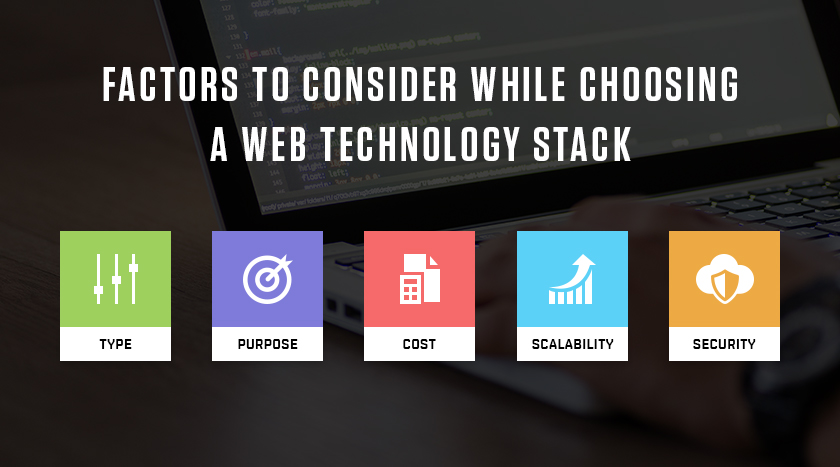Choosing the right technology stack is difficult – especially for startups – because most of them have limited budgets. This means, they need to pick their technology stack very carefully – one which is not only right for their project, but also promising enough to show positive returns.
Technology stack is a combination of programming languages, frameworks, and tools which is used by programmers to develop mobile and web applications.
And the wrong choice of technology stack may result into failure for various obvious reasons.
So, how to choose the right technology stack for your web app development project?
It has been observed that ideally most companies, especially startups, choose technology stack based on their personal preferences.
But that could have repercussions, as personal preferences are subjective, and they may or may not lead you towards the right path.
What if the technology you want to use doesn’t support features that you may need in future?
What if the technology is gradually becoming outdated?
And what if the technology requires rare specialists to develop & deploy?
If you’ve such million questions in your mind or don’t know where to start, this article will surely help you make the right decision.
Factors to Consider While Choosing a Web Technology Stack:
As mentioned earlier, choosing the right technology stack is a real challenge, especially if you’re from non-technical background. But this doesn’t mean it is impossible. Consider the below mentioned factors before you start building your web application and it will set you on the right track:
Factor 1 – The Type of Your Web Application
The first step is to decide the type of web app you want to develop. All web apps can be divided into following three types:
Basic: The basic web applications can be developed using common solutions such as CMS software. These types of applications display very little content and also are bit inflexible. For instance: landing pages, single page websites, etc.
Mid-level: These types of web applications usually have more functions, and they’re built using various frameworks and tools. Example: online stores.
Complex: These types of apps consist of vast amount of functions and third-party integrations. Example: large enterprise solutions.
However, just knowing the type of your web application isn’t enough. You’ll also have to take your business goals into consideration. This brings us to the second factor – Purpose.
Factor 2 – Purpose of Your Web Application
The purpose of your web application or your business goals greatly influences the choice of the technology stack.
Ideally, the main purpose of building a web app is to either store and process vast amount of data or simply to be extremely responsive.
Now, if your main reason to build a web app is to store complex amount of data, then you should opt for frameworks and programming languages that can help you with that.
On the other hand, if you want to build a web application that requires less data-processing, but should be highly responsive, then the choice of technology stack will be different. Such types of applications fall under the category of social networking sites mostly.
Once the purpose is defined, the next factor, i.e. the third vital factor worth considering is the development cost.
Factor 3 – Cost of Your Web App Development
It goes without saying that turning any idea into a product requires investment. And the choice of your technology stack directly impacts the development cost of your web application.
At this stage, there are two main things that you need to consider:
Web Application Development Cost: Fundamentally, the cost of your web application development is composed of the work hours put into it, which is multiplied by the hourly rate of your web development team.
Simply put, this hourly rate is distributed among the people such as developers, project manager, and quality assurance specialists, who are going to develop your application.
And the total amount of work hours required for developing your web application will directly depend on the complexity of your project. By complexity, I mean the number of custom features, third-party integrations, and so on.
In a nutshell, more the complexity of your project, more the development cost.
Web Application Maintenance Cost: If you’ve developed a web application before, then you probably know that developing a web app is just one side of the coin; the other side is maintaining it.
These post-release expenses generally include bug-fixing and maintenance of your overall web application functionality.
Now, even if you hire the most expensive remote team to develop your web application, some post-release bugs are bound to rise up. Saving a part of the budget for such unforeseen expenditure is a wise decision as even after the launch, you are at a safe harbor.
Factor 4 – Scalability
Whether you already know the entire scope of your web application or not, it’s wise to think about the scalability of the application in advance. Because, let’s admit it, we all wish to see our product used and loved by a lot of people & for years to come.
Envisioning about more inclusions and updations for future is good, but how people perceive your application or how does the application engage them is something which can’t be pre-determined.
Broadly put, you can analyze the success ratio of your application based on these two types of scalability –
User Scalability: This means the ability of your web application to handle more users. In simple words, your app must run smoothly even if the number of users grows dramatically.
Functional Scalability: There might come a time when you have to upgrade existing features or add new features to your web application. In this case, you need to make sure that it is done without compromising on the quality or performance of your application.
At the development stage itself, you need to ensure that your chosen technology stack provides ample room for scalability options.
Factor 5 – Security
Ever since the world has seen a shift from traditional to digital, the criminals have also taken a front seat in leaving no gaps as far as cybercrimes and digital thefts are concerned.
According to a report by Websenor, the annual finance losses from data breaches are expected to reach $2 Trillion by the end of 2019.
This means, whether you’re developing a simple landing page or a complex enterprise product, security of your web application should never be neglected. So, when you’re choosing the technology stack for your web application, make sure to read and follow security guidelines of a particular technology before going ahead.
more visit Blog: Best Website Designing Company in Udaipur








